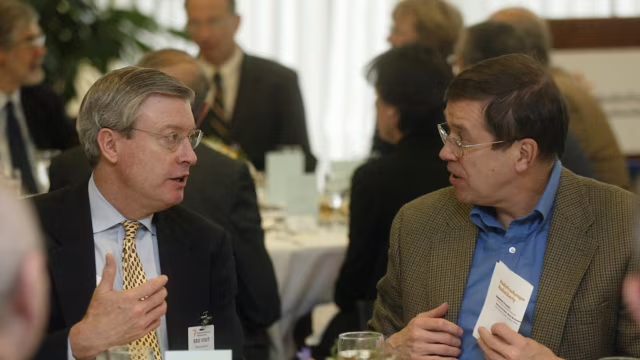Former RFE/RL Lithuanian Service Director Kestutis Girnius Reflects on RFE/RL Reporting in 1989

In an interview with RFE/RL, former RFE/RL Lithuanian Service Director Kestutis Girnius, who was director from 1989 to 2002, reflected on RFE/RL’s role in covering the dramatic changes that swept Eastern and Central Europe in 1989. RFE/RL began broadcasts to Lithuania in 1975 and ended them in January 2004.
RFE/RL: How did it happen that more and more original material could be gained from behind the Iron Curtain?
GIRNIUS: There was no uniform pattern throughout the region. The determining factor was the speed at which reforms took place in each individual state. Thus Romania was a laggard in Eastern Europe, the Baltic States leaders in the Soviet Union. But permission for RFE/RL reporters to travel there was very much the exception. I was granted permission to visit Lithuania only twice; in February 1989 when I travelled to Bonn and the Soviet embassy did not check my background; the second time in December when Lithuanian members of the Congress of People’s Deputies wrote to KGB chief V. Kryuchkov demanding that I be let in. Accreditation was not required in the Union republics, which probably did not even have a procedure to do so. If you got in, you could report, but gaining entry was well-nigh impossible for RFE/RL staffers, in contrast to VOA, which was handled more benevolently.
RFE/RL: When did journalists first manage to enter Eastern bloc countries for reporting?
GIRNIUS: Reporters were not let in, but residents were let out. In 1989 thousands of Balts, including political activists, were allowed to visit Western Europe, providing us with an opportunity to meet with them, develop contacts and friendships. RFE/RL had a good name, so they were eager to share their insights. But it was challenging to retain the contacts once they returned to their home countries, because of the simple fact that there were very few telephone lines. Often it took as much as an hour to get through. The quality of the connection was awful, so one could not simply record an interview and play it on air.
There was no effort to cut off telephone contacts with the West. Even on the day (January 13, 1991) when Soviet troops stormed the television tower in Vilnius, and were expected to attack the Parliament building, we had continual contact for more than 24 hours, except for a few brief interruptions. Finding competent stringers and freelancers was relatively easy. A free press developed very quickly, the best correspondents quickly asserted themselves, and most were more than eager to work for the Radios, which paid handsomely in comparison to local wages. The freelancers were not harassed, but if a crackdown had occurred, they would have found themselves in a very uncomfortable situation.
RFE/RL: How did it happen that East European politicians began to respond to RFE/RL approaches?
GIRNIUS: When talking about East European or Soviet politicians, one needs to differentiate between long-standing apparatchiks and members of the liberation movement. Little effort was made to talk to the entrenched elite, while the newly empowered activists welcomed almost any contact, in part because of the expectation that in talking to a Western correspondent they were informing Western society of their aspirations and hopes, and thus furthering their cause in a way that contacts and interviews with the local media did not.
By Zydrone Krasauskiene.